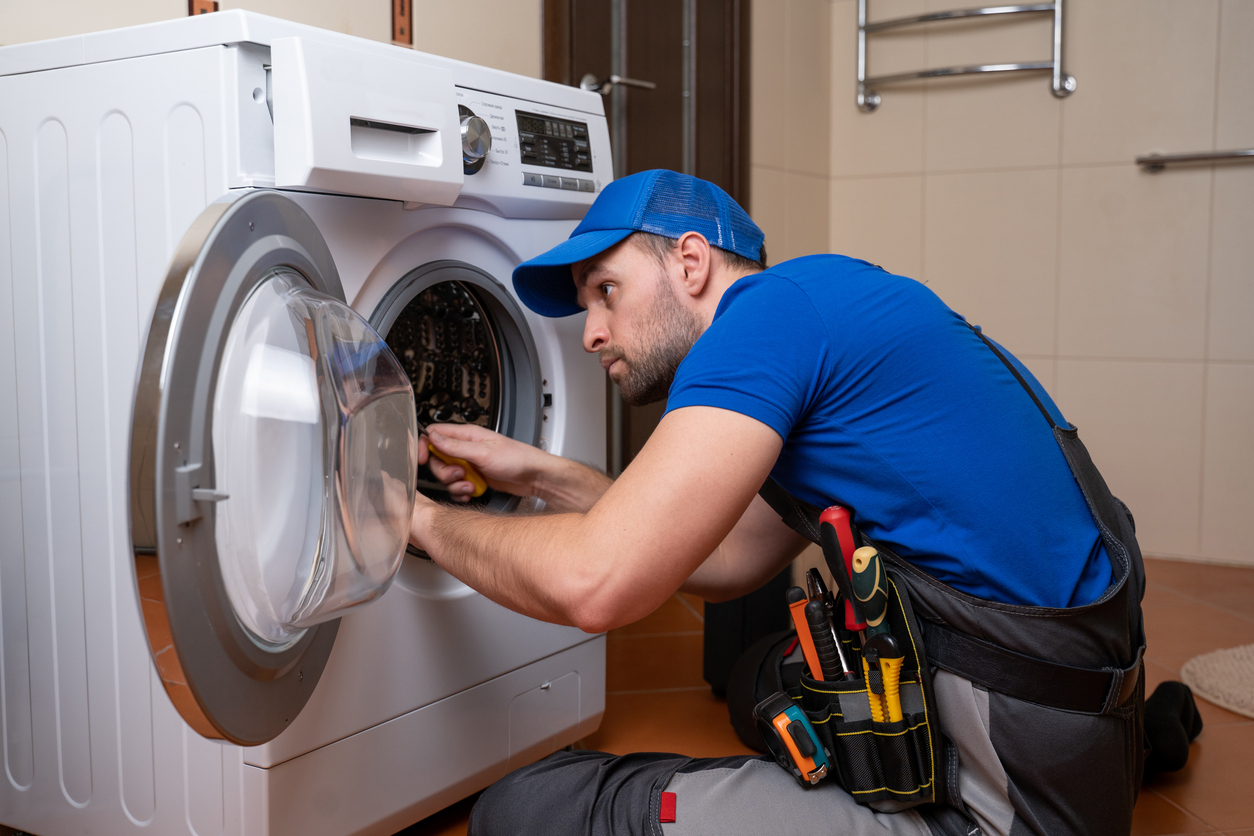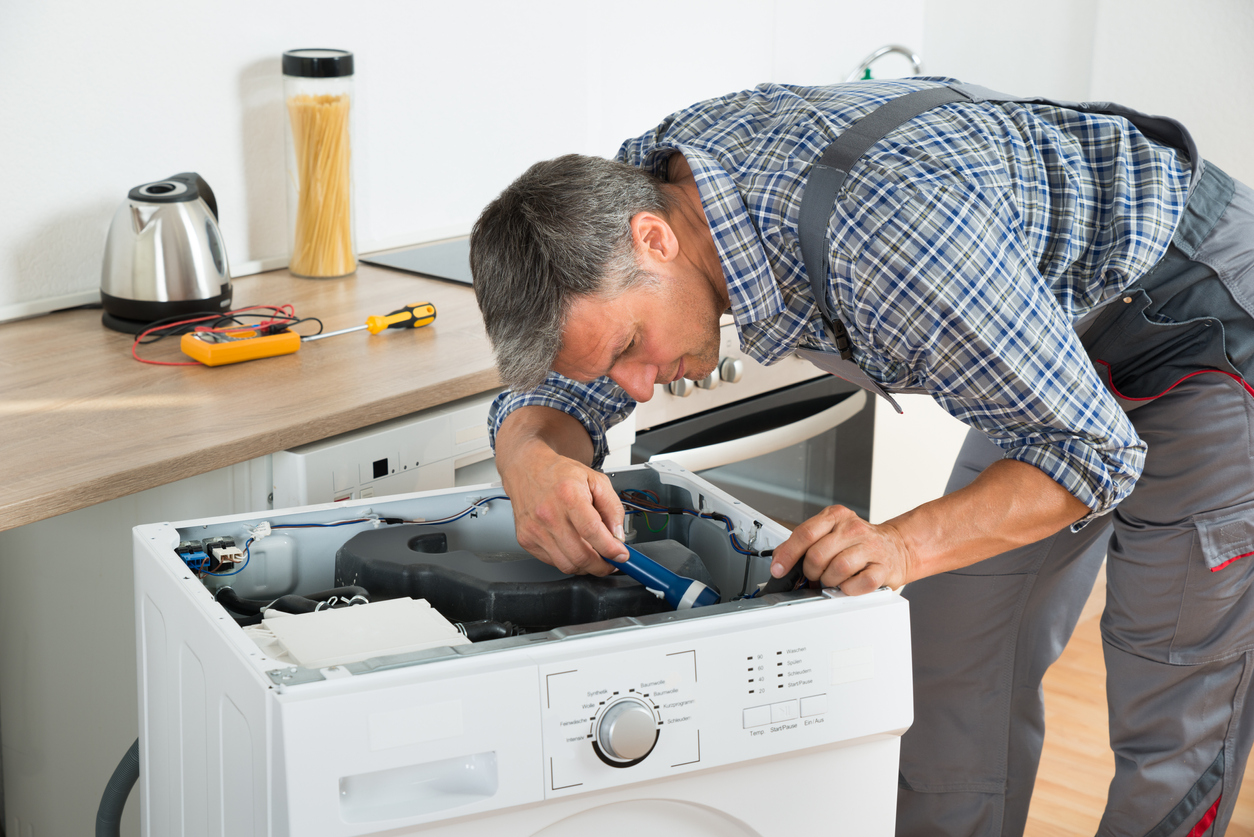

We may earn revenue from the products available on this page and participate in affiliate programs. Learn More ›
Reader’s Digest
- According to Stuart Pyburn, a franchise business coach for Mr. Appliance, a Neighborly company, “Signs that your washing machine needs repair include unusual noises, leaks, excessive vibrations, failure to drain or spin, and abnormal odors during operation.”
- A local appliance repairman can take care of any malfunctions with the washing machine itself. Electrical or plumbing problems will need to be addressed by the appropriate professional.
- If the washing machine is more than 10 years old, replacement may be more cost-effective than repair.
- It’s a good idea for homeowners to see if a manufacturer’s warranty is still in effect before hiring a repair service. Homeowners who have a policy from one of the best home warranty companies (such as American Home Shield or AFC Home Club) may also receive coverage for the repair.
Q: Help! Our washing machine stopped working yesterday, and the dirty laundry is already beginning to pile up. I know I can’t do the repair myself, but I’m not sure whether to call an appliance repair person, a plumber, or an electrician. How do I figure out who to call to fix a washing machine?
A: It’s incredible how much a washer not working can inconvenience an entire household. At best, residents will be stepping around piles of laundry for days. At worst, they’ll be running back and forth to the local laundromat to do emergency loads.
Understandably, those who have never needed washer repairs will have questions about who to call. So, who can fix a washing machine? Is there such a thing as a “laundry repairman”? Does the technician come to the home, or do they have to take the machine to a washer repair shop?
Depending on the nature of the problem, repairs may need to be made to the machine or to the home’s plumbing or electrical systems. Ambitious DIYers may want to attempt to repair the washing machine themselves to get the job done quickly or save on washer repair costs. However, Pyburn recommends that a professional handle “complex repairs, electrical problems, or issues with internal components.” The best candidate will likely be one of three professionals: an appliance repair technician, an electrician, or a plumber.
An appliance repair technician can fix or replace washing machine parts to get the appliance working again.
Anyone who has never dealt with a broken washer may find it difficult to identify the repair that’s needed, let alone how to go about fixing the issue. Pyburn suggests taking a moment to troubleshoot the issue to confirm a professional is needed. “It’s recommended that homeowners troubleshoot minor issues like checking that the washer is plugged in or that the breaker has not been tripped,” he says. “This is a good place to start. Looking for visible problems or simple fixes can avoid an unnecessary service call, but if the problem persists or involves complex components, calling a professional is advisable to prevent further damage and ensure proper repairs.”
A faulty control board is one of the most common parts to fail on a washer, and there are other complex mechanisms that the average homeowner won’t likely understand. Luckily, washing machine technicians have years of experience with washer repairs. If there is a malfunction with a part of the machine, a top-load or front-load washer repairman will know where to get a replacement piece and how to install it. If the problem is not the machine itself but instead the plumbing or electricity, a technician for washing machines will still likely be able to get to the bottom of what is causing the issue and advise on the next steps.
Searching “washer technician near me” is a good way for someone to locate professionals who perform local washing machine repairs. For best results, customers will want to find the best appliance repair services available nearby rather than settle for cheap washer repairs. “When hiring an appliance repair service for washer repairs, choosing a professional [who is] experienced with your appliance’s brand or model is beneficial,” Pyburn advises. “Still, the company’s reliability, reputation, and certification are the place to start.” To help facilitate the repair process, Pyburn suggests that providing the washing machine repairman with “the model number, serial number, and approximate age of your washer, along with a detailed description of what the machine is or is not doing, is a huge help when calling in for service.”

If the washing machine doesn’t turn on at all, you may need to call an electrician.
If the washing machine is not turning on at all, this may be an indication that it isn’t getting power. One way to check for this is to inspect the outlet to make sure the machine is still plugged in. Sometimes, the vibrations from a washing machine will cause the plug to come out of the socket over time. If the machine is plugged in but still won’t turn on, the next thing to check is the circuit breaker. If it has tripped, the switch that provides power to the machine’s outlet will be in the “off” position. In this case, it’s wise to have an electrician investigate the problem.
You can call a plumber if the machine isn’t draining properly.
A plumber may not be the first professional who comes to mind when homeowners are considering who can fix a washing machine. However, drainage problems in a washing machine can be the result of faulty or clogged plumbing. This can result in the washer not spinning or clothes sitting submerged in water. Some minor clogs can be resolved fairly easily by removing the drain hose and running some water through the hose to clear away any obstructions. If this doesn’t remedy the problem, the clog may be deeper down the line.
Another common cause of a washer not draining is improper drain height. Washing machines need their drains to be slightly elevated in order for the water to be propelled out of the drum. A plumber can diagnose whether the drain height needs adjustment or if there are any blockages in the washing machine plumbing.
A plumber can also handle issues with the washing machine’s water supply.
If the washing machine is not filling with water or is filling incompletely, then there is likely a water supply issue. As is often the case when a washer is not draining, the culprit is probably a blockage in the plumbing. First, it’s a good idea for the user to inspect the hoses that supply water to the machine for kinks or clogs. If the machine still won’t fill with water, they can try manually turning on the taps for the washing machine water supply. If they do not turn on or the water pressure is lower than usual, the issue will need to be investigated more thoroughly.
Plumbers are well acquainted with a washer’s plumbing connections since they connect washing machines to their water supply lines regularly. For this reason, it isn’t difficult to find a plumber who can fix washing machines as long as the issue is related to water and gas lines.
Regular washing machine maintenance can keep your machine running smoothly.
A washer not working is a huge inconvenience that can interrupt the flow of daily life. Sometimes appliances break for seemingly no reason, and it’s not always possible to predict an imminent washer failure. But it is possible to make one less likely with regular maintenance such as cleaning the unit with vinegar or one of the best washing machine cleaners. This has the additional benefit of eliminating any unpleasant washing machine smells. “Regular maintenance for washing machines starts with running a clean cycle every month,” says Pyburn. “If your washer doesn’t have a clean cycle with an empty tub, turn the water selection to Hot/Hot and the highest water level. Pour 2 cups of white vinegar and let it run through the heavy-duty cycle. If your washer has a lint filter, check and clean it. Check the hoses behind the washer for cracks and leaks, and inspect the door seal on a front-loading washer for mold and mildew. You can just wipe the gasket clean with a cloth dampened with a bleach/water solution.”
A washing machine cleaning service can also complete this task for the most thorough results. Additionally, it’s advisable for the user to pay attention to any slight changes in the washer’s function to stay ahead of future issues. For example, if the washer is making an unusual noise or shaking more than usual mid-cycle, it’s a good idea for the user to research “washer maintenance near me” and have a washing machine mechanic check it out before the problem worsens.

A professional can tell you whether it’s more cost-effective to fix your washing machine or buy a new one.
Depending on the washing machine’s age and what is wrong with it, replacement may be more cost-effective than repairing the washing machine. Washers that are reaching the end of their lifespan tend to break down frequently. Rather than a homeowner paying to repair a machine that has nearly outlived its usefulness, a replacement can end up making better financial sense in the long run. Most washers and dryers last up to 13 years, so if the washer is at least 10 years old, it’s reasonable to consider replacing it. According to Consumer Reports, a newer, water-efficient washer can use up to 75 percent less water than an older one. New units from the best washing machine brands may also be more energy efficient, so replacement could yield further savings in the form of reduced utility bills. On the other hand, it’s probably worth it to fix washing machines that are less than a decade old and have not had many issues previously. As a rule, if the quote for repairs totals less than half of what a new washer would cost, it’s probably a good idea for the owner to opt for the repair over a replacement.
Even with these guidelines, the decision to repair or replace isn’t always clear-cut. A washing machine repair service will be able to give a rough estimate of how much life the unit has left and recommend the best course of action.
Before calling a pro, check to see if your washing machine repair is covered by a manufacturer’s warranty or a home warranty.
Before getting in touch with a washing machine man, it’s a good idea for a user to find out what kind of warranty coverage might be available to reduce repair costs. Most brand-new washing machines come with a manufacturer’s warranty that is valid for at least 12 months. If the washing machine breaks down during this period, repairs may be covered under the warranty. Those who opted for an extended warranty at the time of purchase will have a longer warranty period. It’s a good idea for them to check the owner’s manual or the warranty itself to find out exactly what is covered and for how long.
Alternatively, homeowners who have a home warranty policy may also have coverage for washing machine or appliance repair. Home warranties with appliance protection cover normal wear and tear (as long as the unit has been well maintained), which is typically not included in a manufacturer’s warranty. If the problem with the washer is related to an electrical or plumbing issue, it’s possible a home warranty would provide some coverage, as home warranty coverage often applies to major home systems. One important caveat is that it might not be possible to hire just anyone who repairs washing machines or home systems—technicians may need to be approved by the warranty company. Policyholders can refer to their warranties or contact the warranty company to understand their coverage and file a claim.
